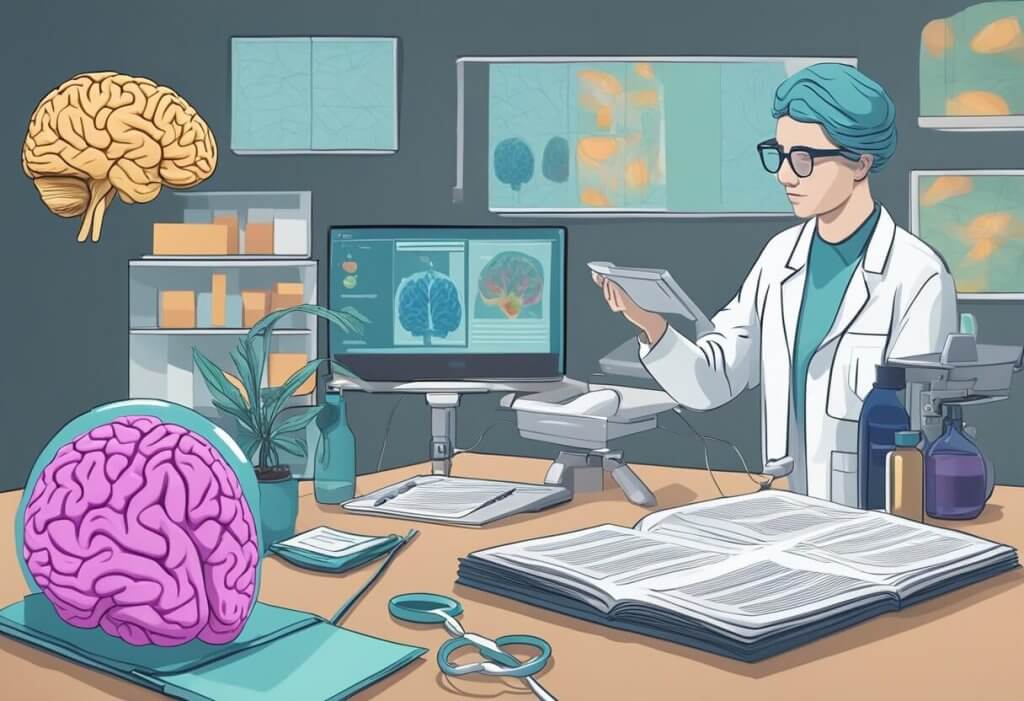Exploring Alternative Treatments
Disclaimer: The anecdotal benefits of CBD mentioned on this website are based on preliminary research and individual user experiences. All information presented here is not meant to substitute for or replace information from health care practitioners. Please click here for our full disclaimer, including side effects, FTC position, etc.
Psychosis can be a deeply unsettling and isolating experience, affecting millions of people worldwide.

While traditional treatments like antipsychotic medications have been the go-to solution for decades, many individuals find themselves grappling with unwanted side effects and limited efficacy. As a result, there’s a growing interest in alternative approaches, and one natural compound has been garnering attention for its potential to alleviate psychosis symptoms: CBD.
Cannabidiol (CBD), a non-intoxicating compound derived from the hemp plant, has emerged as a promising option for those seeking relief from various mental health conditions. With its ability to interact with the body’s endocannabinoid system, CBD has shown potential benefits for neuropsychiatric disorders, including psychosis.
As more people explore the therapeutic properties of this natural remedy, it’s useful to understand how CBD may help manage psychosis symptoms and improve the quality of life for those affected by this challenging condition.
Key Takeaways
- CBD is being investigated for its potential to alleviate psychosis symptoms without the psychoactive effects of THC.
- Research on CBD shows promise in treating schizophrenia and other disorders characterized by psychotic symptoms.
- Clinical studies and patient trials are crucial to understanding the efficacy and safety of CBD for psychosis management.
Understanding CBD and Psychosis

In exploring the potential therapeutic use of cannabidiol (CBD) for psychosis, it’s important to differentiate CBD from other cannabis components. You also need to understand its interaction with the brain’s endocannabinoid system, as well as its potential in managing psychosis symptoms.
Cannabidiol (CBD) vs. Tetrahydrocannabinol (THC)
CBD and tetrahydrocannabinol (THC) are both cannabinoids found in cannabis, but they have different effects on the brain.
THC is known for its psychoactive properties, which can exacerbate psychosis in some individuals. In contrast, CBD does not produce these psychoactive effects and may have antipsychotic properties.
Some studies have shown that CBD might counteract the harmful effects of THC, suggesting a complex relationship between these two cannabinoids in the context of psychosis.
The Role of the Endocannabinoid System in Psychosis
The endocannabinoid system consists of cannabinoid receptors scattered throughout the brain and body. Anandamide is one of the key neurotransmitters, and it plays a significant role in various physiological processes.
Dysregulation of this system has been implicated in the development of psychotic disorders. CBD is believed to interact with this system, but not in the same way THC does.
THC mimics anandamide, binding tightly to cannabinoid receptors and altering normal brain function. Meanwhile, CBD has a more subtle modulating effect on these receptors, which can be relevant in the context of psychosis.
CBD’s Antipsychotic Properties and Symptoms Management
Studies have demonstrated the antipsychotic effects of CBD, suggesting that it could be a potential treatment for psychosis.
For instance, CBD has been found to help manage symptoms in conditions like Parkinson’s psychosis and schizophrenia.
Unlike traditional antipsychotic medications, which can come with a host of side effects, CBD is often well-tolerated. It can also lead to improvements in the symptoms of psychosis, such as delusions and hallucinations, without the significant side effects associated with conventional antipsychotic drugs.
“Research suggests that cannabis-derived delta-9-tetrahydrocannabinol can be linked to the worsening of psychosis and/or other symptoms of schizophrenia. However, there is also evidence to suggest that another cannabis derivative, cannabidiol (CBD), could have potential as a treatment for psychosis.”
From a 2021 article in Schizophrenia Bulletin Open
Clinical Evidence and Research on CBD for Psychosis

In recent years, the potential application of cannabidiol (CBD) for treating psychosis symptoms has been an intriguing topic of research. This section delves into the outcomes of relevant studies, evaluates the safety and efficacy of CBD, and discusses upcoming trends in its therapeutic use for psychosis.
Summary of Clinical Trials and Studies
Several clinical trials have investigated CBD’s impact on psychosis symptoms.
A review pointed to preclinical studies and human experimental work that collectively suggest CBD’s promise as a treatment for psychosis.
Another trial assessed CBD as an adjunctive therapy in schizophrenia, comparing it against a placebo. It found indications of its antipsychotic properties.
Progress has been made in understanding the benefits and limits of CBD as a treatment option. Ongoing investigations are also looking into its positive effects on both positive and negative symptoms.
Assessing the Effectiveness and Safety of CBD
The safety and effectiveness of CBD in psychosis treatment have been largely emphasized in studies.
Clinical trials evaluating CBD against placebo have generally shown a good safety profile.
Studies typically highlight a lower incidence of adverse effects compared to traditional antipsychotic medications such as olanzapine, amisulpride, and others.
Cognitive impairments and issues linked with anxiety have also been areas under scrutiny, with CBD showing potential benefits in these domains.
Future Perspectives in CBD Treatment for Psychosis
Future research perspectives are keen on personalizing CBD treatments for psychosis. They aim to take into account individual responses to broad-spectrum, full-spectrum, and isolate CBD products.
With careful certificate of analysis for each product and ongoing research from institutions such as Oxford University, researchers like Professor Philip McGuire are working towards tailored treatment paradigms.
Continuous research, perhaps supported by companies like Jazz Pharmaceuticals, may soon provide more concrete pathways for CBD’s integration into mainstream mental health care.
Promising Study: A 2022 systematic review concluded: “Collectively, these results suggest that CBD may have significant effects on psychotic symptoms in patients with psychosis.” The review looked at several studies testing CBD for treating psychosis symptoms.
https://www.ncbi.nlm.nih.gov/pmc/articles/PMC9110455/
Frequently Asked Questions
The intersection of CBD and psychosis treatment sparks curiosity and questions, particularly around dosages, effectiveness, interactions with antipsychotics, potential exacerbation of symptoms, anecdotal evidence, and research data.
How much CBD is typically recommended for dealing with psychosis?
For individuals considering CBD as an option for psychosis, dosages in studies have varied. However, one clinical trial showed participants taking up to 800 mg daily.
Are there any mental conditions that CBD is shown to improve?
Research suggests CBD may have a positive effect on several mental health conditions.
For instance, studies have indicated its potential as a treatment for psychosis, and it has been explored for anxiety and depression.
What’s the scoop on CBD’s interaction with other antipsychotic meds?
Evidence concerning CBD’s interactions with traditional antipsychotic medications is still emerging. However, CBD has been found to be well-tolerated and does not appear to interfere negatively with conventional treatments.
Could using CBD potentially exacerbate schizophrenia symptoms?
The concern about CBD exacerbating schizophrenia symptoms is significant. Yet, current literature, including case studies, does not generally report worsening symptoms with CBD use; instead, it may offer symptom improvement.
What are people saying about CBD’s effect on psychosis over on Reddit?
Reddit hosts a variety of personal anecdotes. While not scientifically validated, these discussions often reveal a mixed bag of experiences, ranging from beneficial impacts to negligible effects on psychosis symptoms.
What kind of research has been done on CBD’s impact on hallucinations?
Scientific exploration into CBD’s impact on hallucinations is ongoing. Research, including animal models and human clinical trials, has been conducted to examine CBD’s potential antipsychotic effects and its ability to reduce hallucinations.
CBD has shown potential as a treatment for psychosis symptoms in several studies. In one 4-week trial, 800 mg of CBD was found to be similarly effective as the antipsychotic medication amisulpride in improving psychosis symptoms in patients with schizophrenia.
https://www.frontiersin.org/journals/psychiatry/articles/10.3389/fpsyt.2021.694394/full
